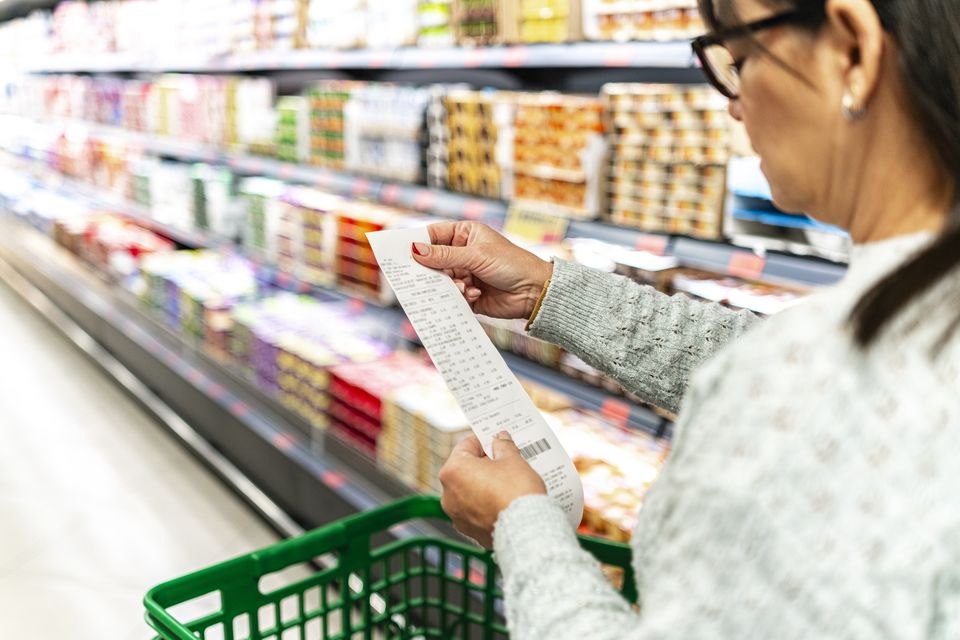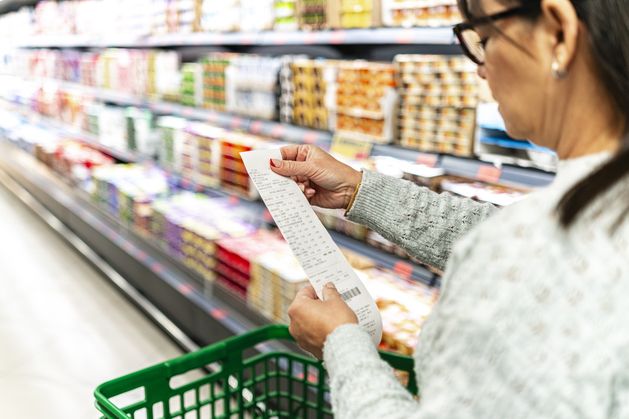The Competition and Consumer Protection Commission (CCPC) said that supermarkets here are not making any higher profit margins than those in other countries.
The findings in a new probe on grocery pricing are set to surprise many consumers who are struggling with a surge in food prices and have laid the blame on supermarkets.
Such has been the jump in prices that food prices in this country are now the second most expensive in the Eurozone, according to the Central Statistics Office.
The Dáil heard accusations from a number of TDs last month that supermarkets are price gouging.
But the CCPC said in a just-released report: “Overall, there is no evidence indicating that competition is not working in the Irish grocery retail sector.”

Irish households are spending up to €3,000 a year more on groceries because of the increased cost of living. Photo: Getty
Today’s News in 90 seconds – 7th August 2025
The competition body was asked by Minister of State for Retail Alan Dillon to update a 2023 probe into competition in the retail sector.
His call came on the back of grocery prices rising at three times the rate of general inflation.
Some meat prices are up 22pc in the past year alone, with butter up by 30pc in a year.
University College Cork economist Oliver Browne has estimated that grocery prices are up more than a third in the last four years.
This means that many families being forced to stump up an additional €3,000 a year due to the rise in grocery prices.
But the CCPC report, entitled ‘Updated high-level analysis of the Irish Grocery Retail sector – August 2025’ concluded that “increased competition in the market over the last 20 years has brought sizeable benefits for consumers”.
This is mainly down to the major retail groups in the market opening new stores all over the country.
CCPC experts said in the report that food price increases in Ireland have been well below the European average, and this coincides with increasing competition in the Irish market.
“The data available on profit margins does not indicate that margins are notably high when compared to international comparators.”
But the report acknowledges that what it calls “significant price increases” since 2021 are having a real impact on consumers both in Ireland and across Europe.
It said one of the drivers for food price rises is the increase of some agricultural product prices, which have been higher in Ireland than the European average.
“While grocery prices have increased significantly since 2021, they have done so at a slower pace than some of the key input costs, such as agricultural prices.
“This suggests that competition in the grocery market has helped limit the impact of increased agricultural prices on Irish consumers. “
This implies that retailers are selling some food items at a loss out of fear that they will turn away shoppers if they charge the full increase they are being charged by food processors.
CCPC analysists found that the profit margins of Tesco, Aldi and Musgrave in this market are between 1pc and 4pc, considered to be modest compared with other sectors.
Tesco has an operating profit margin of 3.7pc, with a figure of 2.4pc for Musgrave, whose stores include SuperValu and Centra.
Aldi’s profit margin in 2023 was 0.8pc.
Dunnes and Lidl do not publish financial results.
“The profit margins for Irish supermarkets align closely with those observed in the UK and other parts of Europe,” the report states.
Both Sainsbury’s and Asda reported profit margins of approximately 3pc for the 2023/2024 period, the CCPC said.
The profit margins for Irish supermarkets are much lower than those of some producers within the market.
CCPC experts found that Unilever – whose brands include Dove, Hellmann’s, Knorr, Lipton and Sunlight – reported a margin of 18.4pc in 2024.
Kerry Group, an international leader in taste and nutrition products, maintained a margin of 11.2pc in 2024.
Glanbia, whose brands include energy bars, dairy products and dairy-free products, had a profit margin of 14.4pc in 2024.
The CCPC said in its report that profit margins along the food supply chain, including buyer power and margins, are part of the role for the new Agri-Food Regulator.
Chairman of the CCPC Brian McHugh told Independent.ie consumers were under huge pressure from rising grocery prices but he said this was not driven by competition problems in the grocery retail sector.
“We did not find evidence of significant competition issues or the need for intervention in the market.
“What we have seen is evidence that the market is working reasonably well. Food inflation in Ireland is lower than the European average,” Mr McHugh said.
He said the entry of German discounters Aldi and Lidl into the market had helped to make their rivals more competitive.

